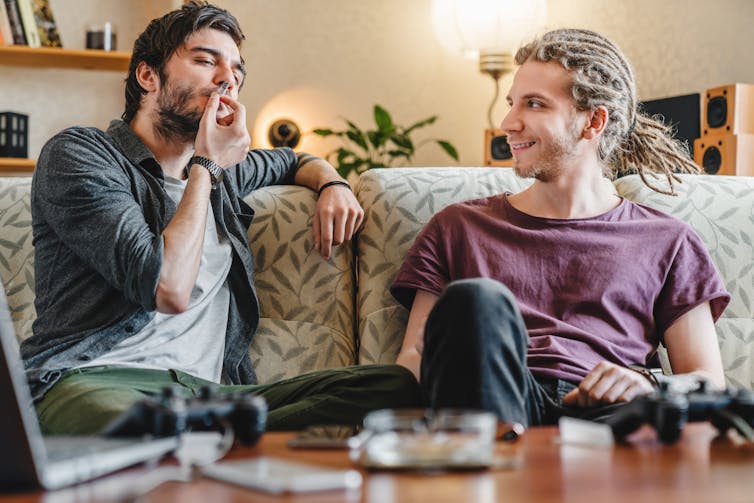Pot, pills and the pandemic: how coronavirus is changing the way we use drugs
- Written by Amy Peacock, Senior Research Fellow, UNSW
There’s no question COVID-19 has changed many aspects of our lives. As drug researchers, we are interested in how the pandemic has affected illicit drug use in Australia.
Our two new surveys of Australians who regularly use illicit drugs show people most commonly reported no change or a reduction in their use of various illicit drugs since COVID-19 restrictions came into effect.
While this may be perceived as a good thing, for people who regularly use drugs, a period of decreased use can heighten the risk of adverse effects, such as overdose, later on.
Read more: Drug use may increase the risk of coronavirus. Here's how to reduce the harms
Tracking drug trends
Many experts, ourselves included, predicted significant shifts in drug trends as governments around the world introduced restrictions to control the spread of COVID-19.
Evidence from major environmental, economic, and other past crises suggests the COVID-19 pandemic may have substantial effects on:
drug use (for example, switching to different substances or being unable to obtain drugs)
drug procurement (for example, shifts to online purchasing and buying drugs in larger quantities)
drug markets (for example, changes in price, purity and availability of illicit drugs).
These changes may increase the risk of drug-related harms, such as withdrawal, drug dependence and overdose. This could be especially problematic given challenges in delivery of drug treatment and harm-reduction services during COVID-19.
 Two in five people we surveyed said they were using cannabis more during COVID-19.
Shutterstock
Two in five people we surveyed said they were using cannabis more during COVID-19.
Shutterstock
We wanted to see if Australians who use illicit drugs had experienced these changes.
We conducted telephone interviews with 389 Australians who live in capital cities and regularly use ecstasy and other illicit stimulants.
We also conducted an online survey of 702 Australians who regularly used illicit drugs in 2019.
We recruited participants for both studies between April and June via social media.
Drug use
Overall, we found the use of most illicit substances had largely remained stable or decreased since March. People most commonly reported they were using drugs like MDMA, ketamine and LSD at a similar level or less than they were before the pandemic.
Conversely, at least two in five people across both studies reported they were using more cannabis than before COVID-19.
These findings are unsurprising given cannabis is mostly used in private homes, whereas drugs like MDMA are more commonly used in public settings such as nightclubs or festivals.
Drug procurement
Most participants across both studies continued to obtain drugs face-to-face. But about 10% reported they had reduced face-to-face collection of drugs, obtained drugs less frequently, and bought drugs in larger quantities since COVID-19 restrictions.
People also reported trying to reduce the risk of contracting COVID-19 by washing their hands before handling drugs, and avoiding sharing equipment such as pipes, bongs, needles and syringes.
And about 10% of participants reported seeking information on how to reduce their risk of COVID-19 when using drugs.
These findings refute stigmatised views that people who use illicit drugs are reckless with their health.
Read more: Drug use can have social benefits, and acknowledging this could improve rehabilitation
Drug markets
Our participants largely perceived the illicit substances they sought were no less available since the start of restrictions.
The exception was MDMA pills; half of participants we interviewed by phone said they were “more difficult” to obtain.
These findings are surprising given illicit drugs like heroin, cocaine and methamphetamine are typically detected at the Australian border, and air travel has been restricted with COVID-19.
However, the effects of COVID-19 on price, purity and availability of drugs may take time to become apparent and will vary by substance.
Reduced drug use is not always a positive
Participants commonly said their reduced substance use was a result of limited opportunities to “go out” and socialise. So as restrictions start to ease, it seems likely people will again increase their use of substances like MDMA and cocaine.
Resuming substance use after a period of abstinence or reduced use can increase the risk of harms such as overdose due to reduced tolerance to the effects of the drug.
 Fewer social gatherings like festivals means less use of some illicit substances.
Shutterstock
Fewer social gatherings like festivals means less use of some illicit substances.
Shutterstock
Harm-reduction strategies — like taking smaller doses, spreading out doses during a session and having a sober person present — can help reduce the risk of these outcomes if people start to use drugs again or use larger amounts.
Peer-based organisations and online resources offer information and advice on how to reduce risk when using drugs.
Read more: Parents of teens, here's what you really need to know about MDMA
We need broader research
Our samples mainly comprised young, educated capital city dwellers recruited via social media. Very few of our participants reported drug dependence or were engaged in drug treatment.
We need research exploring how COVID-19 has affected those who report more problematic patterns of use, like people who regularly inject drugs.
This group may be disproportionately affected by COVID-19 given underlying health issues, poorer health literacy, stigma, and higher economic and social vulnerabilities.
In responding to the impacts of COVID-19 on drug use, we need to remember that evidence shows punitive responses to drug control increase social and economic costs. We believe our findings reinforce the importance of pursuing drug policies and research focused on health, human rights and harm reduction.
Correction: this article originally stated telephone interviews were conducted with 350 participants. Telephone interviews were in fact conducted with 389 participants.
We wish to acknowledge our research participants and the Australian Injecting & Illicit Drug Users League (AIVL) for their contribution to these projects.
If this article has raised issues for you, or if you’re concerned about someone you know, call the National Alcohol and Other Drug Hotline on 1800 250 015.

